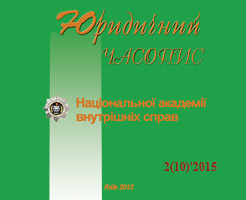Current Problems of Combating Corruption: Realities of Domestic and Foreign Experience
Keywords:
resistance, corruption, experience, foreign countries, European integration
Abstract
Corruption is a criminal action in the field of public administration, politics, economy, taken by government officials, political and public persons misusing rights and powers to fulfil personal interests and enrichment. Corruption is connected with the crime. The elements of corruption may be malpractice for special services in promoting the protection of certain projects, the shadow financing of social and political projects, lobbying personnel on the basis of personal or corporate commitment, illegal loans, privileged access to resources, etc. In general corruption in the modern world poses a serious threat to the state, democracy, human rights and social justice. It hinders the economic development of the country, endangers the development of democratic institutions and undermines the moral capacity society. Moreover, in the context of globalization, corruption turns into an international problem because illegal corruption relations affect the interests and welfare of the majority of countries, which is cricial. The article deals with the experience of foreign countries in combating corruption and formulates proposals to improve the criminal legislation of Ukraine to counteract this socially dangerous phenomenon.Downloads
Download data is not yet available.
Abstract views: 119 PDF Downloads: 72
How to Cite
[1]
Bodnar, V. 1. Current Problems of Combating Corruption: Realities of Domestic and Foreign Experience. Law Magazine of the National Academy of Internal Affairs. 10, 2 (1), 247-259.
Issue
Section
International experience
Copyright (c) 2017 Law Magazine of the National Academy of Internal Affairs

This work is licensed under a Creative Commons Attribution-NonCommercial-NoDerivatives 4.0 International License.
- Authors reserve the right to authorship of their own work and transfer to the magazine the right of the first publication of this work under the terms of the Creative Commons Attribution License, which allows other persons to freely distribute published work with mandatory reference to authors of the original work and the first publication of an article in this magazine.
- Authors have the right to enter into separate additional agreements on non-exclusive dissemination of the work in the form in which it was published in the journal (for example, to post an article in the institution's repository or to publish as part of a monograph), provided that the link to the first publication of the work in this journal is maintained.
- The journal's policy allows and encourages the posting of articles by authors on the Internet (for example, in electronic storehouses of institutions or on personal websites), both before the submission of this manuscript to the editorial office and during its editorial processing, as this contributes to the creation of a productive scientific discussion and positively affects the efficiency and dynamics of citing the published work.




